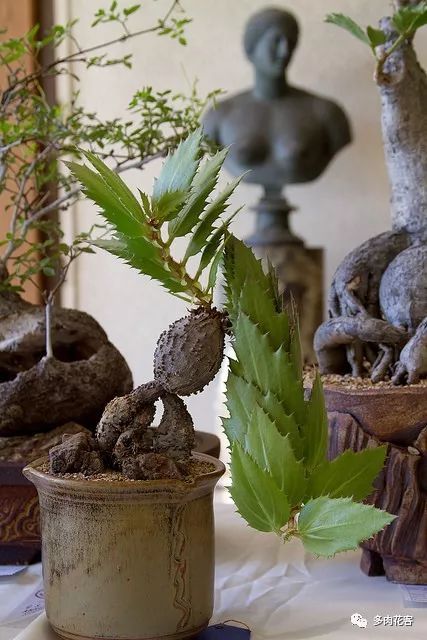Have you ever seen the flowers of the sweet and sour passion fruit?

Just after the summer, the sun in most parts of the country is still on duty, trying to spread more heat to places where it is not needed. In this kind of day, have a cup of "meteor shower" fruit tea when you have to go out to suffer, it can bring back a lot of blood to quench thirst and relieve summer heat.
The black particles in the Meteor shower are the seeds of today's protagonist passion fruit. Go to the fruit store to buy a complete passion fruit cut in half, you can see that the fruit adhered to the wall to grow "a circle" of black particles in the yellow, the black part is the seed of the passion fruit, and the translucent yellow part is its aril. It is also the main edible part of passion fruit.
Passion fruit is frightening after being cut. The contents of). Picture: Fibonacci / wikimedia
Passionflower belongs to another
Passion fruit is also known as passionflower because passion fruit is mainly selected from Passiflora edulis, which belongs to the genus Passiflora.
In fact, there is also a species of P. coerulea in this genus, which is officially called passionflower in Chinese. The fruit is very similar to the egg fruit, but it is small and sour, and few people eat it, so most people are strange to it, resulting in the wrong object.
But if you often go to the flower market or have a penchant for raising lianas, you should be familiar with the name "clock flower". The "clock flower" in the flower market is not the authentic clock flower of Turnera, but P. coerulea. The flowers of most passionflower plants have a large beard-shaped Corolla shaped like a dial scale, coupled with their forked pointer-like pistils and stamens, just like a clock disk.
Look at the time ~ picture: AL? KUTLU / flickr
Curious flowers, observe in this way
Passionflower flowers look very curious, but they actually follow the basic structure of flowers if they decompose layer by layer. The bottom 10 white "petals" can be divided into two rounds-the bottom one is a slightly greenish calyx, and the upper one is whiter.
Above is the most eye-catching part of the whole flower-the Corolla, which is the most obvious difference between most passionflower flowers. Generally speaking, their color arrangements are different. The Corolla of passionflower P. coerulea is deep purple at the base, white at the middle and light blue at the top, while the egg fruit is light green at the base, purple near the base, white at the tail and twisted.
Passionflower P. coerulea (left) and egg fruit (right). At the same time, it can be noted that the leaves of today's protagonist egg fruit are trifid. Picture: FreeImages.com & B.navez / wikimedia
Further up is the stamen. Passionflower flowers have an androgynophore-first five stamens separated, with relatively large anthers at the end, then an ovary above, and then three separate pistil styles.
Is it passion or suffering?
Although passionflower looks like a clock plate, around 1700 Christian missionaries in Brazil, in order to convert indigenous people to Christianity, gave it the name flor das cinco chagas, meaning "flowers with five wounds", after the form of the native passionflower, as a symbol of the crucifixion of Jesus.
Later, the flower was called passioflos, in which passio means "suffering"; then passio extended the meaning of "uncontrollable passion" (that is, torture), derived passion "passion"; and then into the English environment produced the name passionflower, which was misunderstood as "passion flower" and misunderstood as "passion fruit" (in fact, "suffering flower", "suffering fruit").
Some kind of passionflower (Passiflorasp.), regardless of the original meaning, purple flowers are indeed visually passionate. Picture: Madereugeneandrew / wikimedia
When Passionfruit became a more common fruit in the Chinese market, it got the name "passion fruit" in direct transliteration. But in addition to transliteration, part of the reason for the name is that it contains a lot of aromatic substances similar to other tropical fruits, which refers to "hundred" incense. However, open a search engine to enter "passion fruit", you will see that it contains more than 100 kinds of fruit flavor, this is nonsense.
The sour taste of passion fruit comes from organic acids such as malic acid, quinic acid and oxalic acid, rather than vitamin C. Well, although it does contain a lot of vitamin C. Many people who like passion fruit love its sour taste, but at present, passion fruit on the market are specially selected varieties with weak sour taste.
Did you drool? Picture: pixabay
All kinds of strange "egg fruit"
The fruit of the original egg fruit is generally purple-black after ripening, and the acidity is not high, but the diameter of the fruit is small, the water content is low, and the edible use is weak, while its variant egg fruit P. edulisf.flavicarpa is yellow after ripening, with large diameter and high water content, but unfortunately, the aroma is weak and the acidity is high, and it is not easy to self-pollinate and bear fruit, so the planting cost is high. It was not until the introduction of the two hybrid lines that these shortcomings were overcome and passion fruit was officially put on the market in large quantities.
Relatively rare yellow fruit and egg fruit on the market. Picture: liveincostarica.com
The mature fruit of the hybrid strain is purplish red with large diameter and high water content, low acidity, high sweetness and obvious aroma. The most important thing is that self-compatibility is good and self-pollination can bear fruit, which allows us to buy it directly in the fruit store at a lower price.
Passion fruit on the market. Picture: David Monniaux / wikimedia
In addition to egg fruit, many other species of passionflower have been included in the category of edible passionfruit. The more common ones are banana passion fruit P. tarminiana (banana passionfruit) and passionflower P. quadrangularis.
Among them, banana passion fruit is not distributed in China, and it seems to be noticed by some people in recent years, and there is a tendency to promote it as a new "exotic fruit". The fruit is long in shape, yellowing when ripe, slightly like a banana (in my opinion, it is actually more like an orange or Aristolochia manshuriensis, including granular content), and its sweetness is also obvious, but it is still a minority fruit at present. Can only be bought and tasted in the online imported fruit store.
Followed by ripe banana passion fruit, Australian finger orange and trifoliate Akebia trifoliata fruit. Picture: blogspot.com & mercadolivre.com
Passionflower has long been planted in the southernmost provinces of China, and the flowers have high ornamental value, but the edible fruit seems to be less. However, in Vietnam and other places, passionflower, a large fruit shaped like papaya, has long been eaten as a vegetable. Although there is no well-developed aril and a large amount of fruit juice to eat as fruit, passionflower, which is not fully ripe, can be directly cut into pieces and cooked in pulp, which can be regarded as a qualified "melon".
The flower of Daguo passionflower has the gorgeous shape of Kesuru style. Picture: mercadolivre.com
Finally, a small Tip is introduced: it is easy to survive when passionflower is grown in a small amount. If you are interested, buy one more passion fruit and try to plant it.
This is the 224th article in the fourth year of the species calendar, from the author of the species calendar @ ArcherEmiya.
- Prev

My mother-in-law is in poor health. I give her two thousand five a month. I heard her chatting with her neighbors. I won't give it.
(from readers, pictures of this article are from the Internet) my mother-in-law is not in good health. I give her 25 thousand a month. I heard her chatting with her neighbors. In the past, I always thought that filial piety and caring for the family were virtues.
- Next

A group of succulent works of foreign succulent exhibition
Succulent knowledge | succulent beauty map | maintenance experience | greenhouse life | Cyphostemma segmentatumEuphobia brevirama is a very special color of Euphorbiaceae. Haworthia herbacea var.herbaceaOthonna...
Related
- Wuhan Hospital Iron Tree Blooming Result Was Instantly Frightened by the Gardener Master
- Which variety of camellia is the most fragrant and best? Which one do you like best?
- What is the small blue coat, the breeding methods and matters needing attention of the succulent plant
- Dormancy time and maintenance management of succulent plants during dormancy
- Minas succulent how to raise, Minas succulent plant pictures
- What are the varieties of winter succulent plants
- How to raise succulent plants in twelve rolls? let's take a look at some experience of breeding twelve rolls.
- Attention should be paid to water control for succulent plants during dormant period (winter and summer)
- Watering experience of twelve rolls of succulent plants
- Techniques for fertilizing succulent plants. An article will let you know how to fertilize succulent plants.

